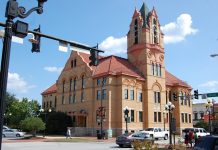By David Meade
During their meeting Tuesday, the Anderson School District One Board and Superintendent heard concerns from a local pastor and more than twenty members of his congregation, about the recent Palmetto High graduation program.
Pastor Robbie Robertson of Trinity Baptist Church in Williamston said he wanted to go on record that he was disappointed and offended that the benediction and invocation were removed from the program “to adhere to the law and our constitution.”
Robertson quoted the Constitution stating “Congress shall make no law respecting an establishment of religion, or prohibiting the free exercise thereof,” and said that nowhere does it state anything about “separation of church and state.”
Robertson said that no matter what the US Department of Education or some liberal judge or even the Supreme Court says, it is unconstitutional for any government body, to make any law or policy prohibiting the free exercise of religion.
Robertson said the nation was founded on Biblical principles by Godly men.
“We as a community have been known for many years to include and seek God in our daily lives,” Robertson said.
Robertson said that he is thankful that the Nation’s and State’s Senate and House opens with an invocation and mentioned other examples.
“It is hypocritical to tell our students it is illegal to print the words, Invocation and Benediction in our graduation program but allow students to pray.”
Especially since it is still deemed acceptable to begin this meeting tonight here in the District main office with prayer listed as the Invocation on the agenda.”
Robertson’s comments were received as information.
When asked by one of the church members who made the decision to remove the items from the program, Havird stated that as superintendent he was responsible for the decision.
Following the meeting, Havird said that his responsibility as superintendent is to provide “a balance of allowing students the full opportunity to practice their religion as they choose, without telling them how to do it”, while at the same time meeting the requirements and guidelines provided by the U. S. Department of Education and District One attorneys.
He said that though the invocation and benediction were not listed on the graduation program, each of the student speakers on the program are free to express their religion as part of their comments.
“They are not censored and it is up to them whether they make their comments religious or not,” Havird said. “It is their choice.”
“The District’s practice is to allow students chosen from class rank, the opportunity to give a short welcome, pledge, or lead the alma mater and to write their own speeches. They often use their platform to address a topic and some include religious references.”
Havird said it is his responsibility to make sure Anderson One “is following the Constitution and to protect the District from legal challenges from organizations that want to totally eliminate students’ rights to engage in religious speech during the school day and at school events.”
According to Havird, the US Department of Education and the U. S. Supreme Court require teachers and school administrators to take a position of neutrality toward religion, showing neither favoritism nor hostility.
He said according to District One attorneys, it has long been settled law that school districts cannot require an invocation, benediction or other official prayer in a graduation or similar ceremony.
Havird said Anderson One is fully committed to supporting students’ constitutional right to practice and publicly express their religious faith and views at school functions.
“We go to the maximum extent to allow students to practice their faith,” Havird said.
He cited several programs AD1 supports including released time education, student initiated and led faith based organizations and clubs, Good News Club, and private baccalaureate services held by local churches.
The School District has also provided facilities for rent to many new or founding faith based organizations through the years, he said.
Havird said that he had met with Pastor Robertson prior to his appearance before the board and that he had responded to Robertson with similar comments noted in a letter.
Havird also said that the Supreme Court had ruled that school boards and municipal governments could open their meetings with a prayer.
















